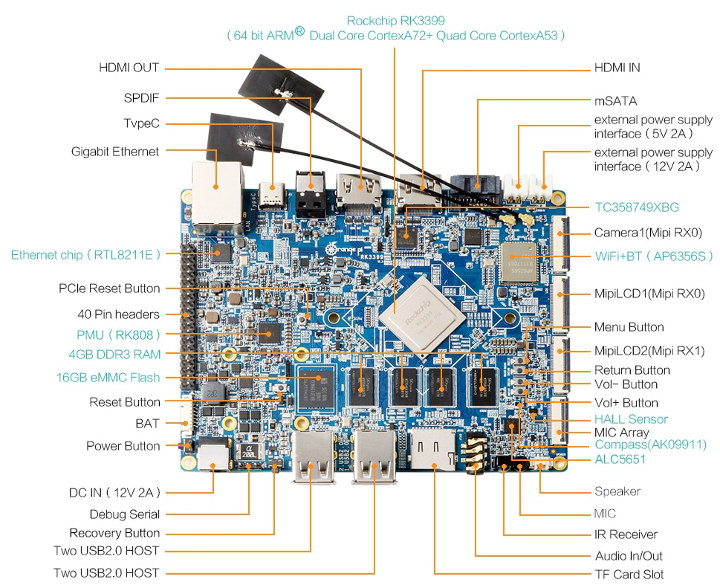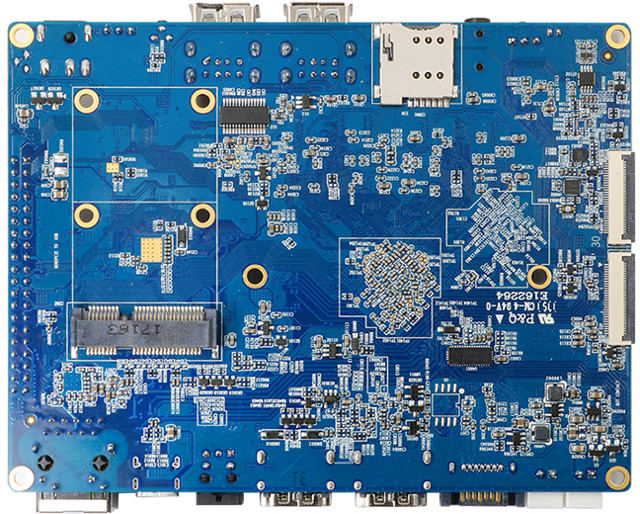Orange Pi RK3399 development board launched last year, further crowding the RK3399 space. The board did not target the lower end of the market with a $109 price tag, but still came with only 2GB of RAM. Shenzhen Xunlong has now introduced a 4GB RAM version of the board for $99.96, with the 2GB version now selling for $89.38. Both boards can be purchased on Aliexpress.

Apart from the RAM capacity, Orange Pi RK3399 “4G” specifications have not changed:
- SoC – Rockchip K3399 hexa-core big.LITTLE processor with two ARM Cortex A72 cores up to 2.0 GHz, four Cortex A53 cores, and an ARM Mali-T860 MP4 GPU with support for OpenGL 1.1 to 3.1 support, OpenVG1.1, OpenCL, and DX 11
- System Memory – 4 GB DDR3
- Storage – 16 GB eMMC flash, micro SD card, mPCIe (for mSATA/LTE), and SATA interface
- Video Output/Input & Display Interfaces
- 1x HDMI 2.0 up to 4K @ 60 Hz
- 1x DisplayPort (DP) 1.2 interface up to 4K @ 60Hz (via USB type C port?)
- 2x MIPI DSI interface up to 2560×1600 @ 60 Hz
- 1x eDP 1.3 (4-lanes @ 10.8 Gbps)
- 1x HDMI input port
- Video Decode – 4K VP9 and 10-bit H.265 video codec support up to 60 fps
- Audio
- Digital audio output via HDMI or DisplayPort
- 3.5mm combo jack with stereo audio output and mic input
- 1x optical S/PDIF
- 1x speaker header (1.5W 8Ω or 2.5W 4Ω)
- 1x on-board microphone
- 1x microphone array interface
- 1x I2S output and input interface up to 8 channels
- Connectivity – Gigabit Ethernet port (via RTL8211E transceiver), dual-band 802.11ac 2×2 MIMO WiFi and Bluetooth 4.1 LE (AP6356S module)
- USB – 4x USB 2.0 host ports, 1x USB 3.0 type C port
- Camera – 2x MIPI CSI interfaces up to 13MP for each interface
- Sensors – Gyroscope+G-Sensor (MPU6500), Gyroscope (LSM6DS3), HALL Sensor (HAL248TWCL), Light Sensor (CM32181), and Compass (AK09911)
- Debugging – 3-pin serial header
- Expansion
- 40-pin GPIO 2.54mm pitch female header with 4x I2C, 1x SPI, 2x UART, 5x GPIO, etc…
- 1x mini PCIe for LTE (USB) or mSATA
- SIM card slot
- Misc
- IR receiver
- 2x power status LEDs (red and green)
- 1x SATA power status LED (green)
- Buttons: reset, power, recovery, menu, return, vol+ and vol-
- Power Supply
- 12V/2A via DC jack (5.5/2.1mm) or 2-pin header
- 5V via type C port or 2-pin header
- Dual battery support (7.4V)
- RK808 PMU, BQ25700 Charger IC, CW2015 Fuel Gas
- Dimensions – 129 x 99 mm
- Weight – 99 grams

Software-wise you’ll find Android and Ubuntu/Debian desktop/server images that have last been updated in February / March of 2018 on the download page, as well as the Android SDK and Linux source code. The community appears to have focused on lower-cost RK3399 boards such as NanoPi NEO4 or Rock64Pro, and for example, there’s no Armbian image for the Orange Pi RK3399 board, even one suitable for testing (WiP).

Jean-Luc started CNX Software in 2010 as a part-time endeavor, before quitting his job as a software engineering manager, and starting to write daily news, and reviews full time later in 2011.
Support CNX Software! Donate via cryptocurrencies, become a Patron on Patreon, or purchase goods on Amazon or Aliexpress. We also use affiliate links in articles to earn commissions if you make a purchase after clicking on those links.





That’s funny. RK3399 with 4GB DDR3 — does anyone remember the official reason why Hardkernel canceled their N1?
The reason there exist no Armbian images yet is mostly since hardware wasn’t available (from a software point of view all RK3399 thingies are the same except DRAM initialization and bootloader stuff). Some months ago when I still joined Armbian forum Igor said Steven would’ve sent out some developer samples eventually. I guess here progress can be monitored: https://forum.armbian.com/topic/8898-ramblings-and-progress-with-the-rk3399/
PS: There seems to be a typo in the first sentence (crowdfunding).
The reason N1 was canceled is publicly stated:
https://forum.odroid.com/viewtopic.php?f=149&t=31277
TL;DR:
The DDR3 status was end-of-life (EOL) and in short supply (six months ago). This affected availability and pricing. They also stated that they wanted four years of availability which was not possible (likely due to EOL), so they decided to use a newer and better SoC instead.
I thought it was the memory supplier dropping the part which would have forced them to redesign the board to use different chips.
“Some months ago when I still joined Armbian forum” … have you left the Armbian forum? Why?
I leave forums where people who don’t know what they’re doing have moderator permissions and mis-use them to censor stuff they don’t understand.
Just realized that schematics for the board were available online. I always wondered what’s up with PCIe, USB and SATA on this board…
SATA functionality is provided by an USB3-to-SATA bridge (ASM1153E) which probably means the SATA port and mSATA usage are mutually exclusive. Performance with spinning rust will be fine, with SSDs random I/O will slightly suffer compared to a PCIe attached SATA solution (sequential performance will be fine at around 400 MB/s).
The other USB3 port is available as USB-C. All four USB2 receptacles are behind an internal hub, while the other USB2 host port is routed to the mPCIe slot (so USB available on pins 36/38 for WWAN modems or other USB only mPCIe cards).
No idea about PCIe (maybe available at an FPC connector on the bottom PCB side?)
Lots of weird decisions…
Why weird? You just need the appropriate use case for this board. Up to 5 different displays to be connected, MIPI CSI and HDMI in, mPCIe/USB + SIM card slot for cellular connectivity, HDD or SSD easily integrated, 4 ports for common USB peripherals.
I bet this board or a slightly modified version has been developed for a commercial (Android based) project…
Probably…
I just don’t get why playing with usb hubs and usb2sata while letting pcie untouched
> usb2sata
It’s an ASM1153E (good one and UAS capable) and connected via USB3 SuperSpeed. Sequential storage performance is same or even slightly better compared to the usual el cheapo PCIe attached SATA controllers like ASM1061: https://forum.armbian.com/topic/1925-some-storage-benchmarks-on-sbcs/?do=findComment&comment=51350
When Hardkernel designed their ODROID N1 over a year ago they only used a single PCIe lane to connect such an ASM1061. They believed RK3399 wouldn’t be suitable to saturate more than a single Gen2 PCIe lane (for whatever reasons). Since Xunlong designed the RK3399 board above a lot earlier maybe they also believed into RK3399 + PCIe would not be working? PCIe is also a driver thing so testing PCIe with RK3399 back in 2017 might have been a real sh*t show?
Those RK3399 vendors who started earlier made some design decisions that look somewhat weird today when looking at and using later RK3399 designs.
OK now got your point. Might be an explanation for those design decisions.
Still for me personally a rockpro 64 makes more sense. Or any of friendlyarms offerings once there will be pcie hats.
Do you know if the HDMI input of this board can be used in Linux? For example as a capture device or IP encoder. I know most of the SBCs with HDMI input are either not supported by software or only suitable for pass-through.
The problem with HDMI input is that most of the HDMI feeds have HDCP encryption, that’s why they don’t work.
I do not know the specifics of HDMI input on the RK3399 but I’m sure they aren’t going to give you a HDCP decryption key.
> HDMI input on the RK3399
Please see ‘TC358749XBG’ mentioned above on one of the pictures.
Good catch!
Some HDCP switches to non-HDCP: https://www.tweaking4all.com/home-theatre/remove-hdcp-hdmi-signal/
Well Aliexpress says they have sold 50 2GB boards and 2 4GB boards, such high volume sales, for all that design and work. Not forgetting taxes.
The 4 GB board is brand new. Plus, it’s only Aliexpress, the whole volume within China goes via Taobao or other channels. International sales may also go via ebay or Amazon marketplace or retailers. So I think the volume should be higher than that. If it’s meeting the expenses, no idea. But Xunlong probably gets some government support, so don’t worry about them.
I’m just wondering is it gonna be this board, or wait for the Odroid N2? I want to get a new board, but tired of waiting 😉
No housing, no cooling, no Armbian (yet). Why should I buy this board (yet)? I like the hardware, but housing, cooling and software is imperative.
Apparently, some people have troubles finding a power supply for their Orange Pi RK3399 board, so Shenzhen Xunlong is now selling a 12V/2A power supply for the board: https://www.aliexpress.com/item/33032657212.html